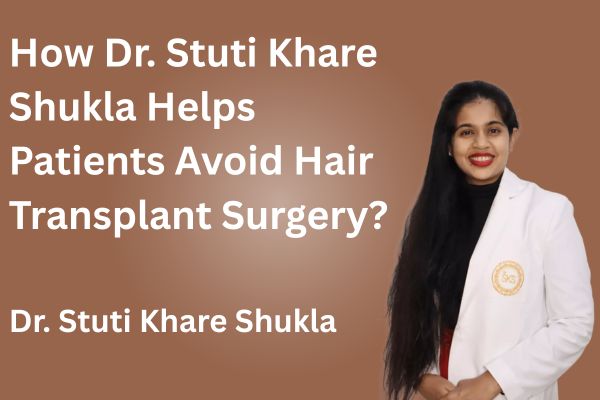Patients Avoid Hair Transplant Surgery – For many people facing hair thinning or baldness, the thought of hair transplant surgery seems like the go‑to solution. But surgery isn’t the only path—nor is it always necessary. Dr. Stuti Khare Shukla, a leading dermatologist in India, has helped thousands of patients avoid transplants by using powerful non‑surgical treatments. This blog explores exactly how Dr. Stuti Khare Shukla helps patients avoid hair transplant surgery, what methods she uses, who they are best for, and what results patients can expect.
Early Intervention: Catching Hair Loss Before Surgery Becomes the Only Option
One central reason people need transplants is that they wait too long. Once hair follicles are lost or donor areas thin out, surgical options may be limited. Dr. Shukla emphasizes acting early—when thinning is visible, or hair fall becomes noticeable. Through early evaluation, she can often preserve existing follicles and prevent or delay bald patches.
- Patients usually consult her when pattern hair loss begins, or when issues like postpartum shedding, hormonal imbalances, PCOD, thyroid problems, or telogen effluvium are causing diffuse thinning.
- By identifying scalp health, lifestyle, nutritional status, stress, and hormonal factors early, Dr. Shukla can design non‑surgical care to correct or mitigate damage.
The Power of Hair Growth Booster®: Non‑Surgical Alternative That Replaces Transplants in Many Cases
What Is Hair Growth Booster®?
Dr. Shukla developed the Hair Growth Booster®, a 5‑minute non‑surgical, FDA‑approved treatment. It involves delivering a specially formulated solution—rich in growth enhancers, peptides, vitamins, and nutrients—directly to the scalp. The goal is to revive follicles, increase blood circulation in the scalp, and create an optimal environment for regrowth.
How Hair Growth Booster® Helps Avoid Transplant Surgery:-
- No surgery necessary – because it doesn’t remove or move hair; instead it aims to regenerate what remains.
- Minimal downtime – patients can resume daily life immediately; no long recovery or post‑surgery restrictions.
- Effective for various types of hair loss – genetic/hormonal pattern thinning, alopecia areata, advanced thinning in many cases, and shedding from health or lifestyle changes. Some patients who might otherwise have opted for transplants have seen good restoration with Booster alone.
Comparison: Hair Transplant vs. Hair Growth Booster® in Avoiding Surgery
| Feature | Hair Transplant Surgery | Hair Growth Booster® (Non‑Surgical) |
| Procedure Type | Surgical grafting from donor to recipient areas | Non‑surgical, topical / scalp nourishing process |
| Recovery / Downtime | Several days/weeks with healing, swelling, etc. | Almost none; immediate return to routine |
| Suitability | Must have sufficient donor hair and tolerate surgery | Broad suitability: early thinning, genetic / hormonal loss, alopecia types, etc. |
| Speed of noticeable result | Depending on surgery and healing, months for visible growth | Many patients report visible improvements in 4‑6 weeks; more substantial transformation by 3‑4 months |
| Risks / Side Effects | Surgical risks, donor area scarring, chance surgeries may not “take” fully | Very low risk; FDA‑approved; minimal discomfort or side effects reported |
| Maintenance | May still require supporting treatments post‑surgery | Maintenance through Booster sessions, home‑care and follow‑ups; often less disruptive and costly over time |
Because of these advantages, many patients in Dr. Shukla’s clinics who had considered transplants decide to try the Booster first—and often are able to avoid surgery altogether.
Case Studies: Patients Who Avoided Surgery
Real patient stories illustrate how this works in practice.
- Mr. Shardul Ingle (Alopecia Universalis): He had near complete scalp loss in his condition. Under Dr. Shukla’s non‑surgical treatment plan, including the Hair Growth Booster®, he achieved full scalp coverage in three months. This transformation meant he canceled plans for surgery.
- International Patients: People from USA, UK, UAE, and Italy who consulted online, followed booster protocols and regained substantial hair density without traveling or undergoing transplants.
These examples highlight that even in cases where loss seemed advanced, surgery was not always required. The Booster routes, combined with individualized plans, achieved outcomes that made transplants unnecessary or delayed.
Tailored Treatment Plans: Customization is Key
How Dr. Shukla helps patients avoid surgery isn’t simply by offering a single treatment—it’s about customizing:
- Detailed consultation (online or in‑clinic) to assess scalp health, hair density, donor areas, medical history.
- Personalized plan that may include the Booster sessions, home care kits, dietary & hormonal evaluation, lifestyle clean‑ups (stress, sleep, nutrition).
- Regular monitoring & follow‑ups to see early results, adjust dosage or frequency of treatment, ensure scalp conditions are optimal.
- Support for international or remote patients via online guidance and shipped home protocols/kits. This allows patients to adhere to treatment without needing to travel.
When Surgery May Still Be Advised—and How Booster Helps Even Then
While Dr. Shukla helps many avoid transplant surgery, there are cases where surgical options may still be considered. For instance:
- When donor area is strong and patient wants immediate coverage of large bald zones
- When non‑surgical methods have been tried over long periods without sufficient improvement
However, even in those situations, Dr. Shukla often suggests using the Hair Growth Booster® before surgery to improve scalp health, strengthen existing follicles, and maximize surgical success. The Booster can also be used after surgery to ensure transplanted follicles thrive, reduce shock loss, and enhance healing.
Scientific Credibility & Recognition: Why Patients Trust This Strategy
Several factors contribute to why Dr. Shukla’s non‑surgical approach is respected and seen as a viable alternative to surgery:
- The Hair Growth Booster® is FDA‑approved, showing that its safety and efficacy have gone through rigorous testing.
- Clinical data and patient results show high success rates, with visible improvements early in treatment.
- Media reports highlight that this non‑surgical Booster is replacing hair transplant surgery in many cases, due to high effectiveness and low downtime.
- Awards and recognitions reinforce confidence in the method and the doctor. Dr. Stuti has received many national/international awards for her non‑surgical hair loss restoration work.
Dr. Stuti Khare Shukla Contact Information
Social Media Links:-
More Ways to Contact:-
Conclusion
Surgery is often presented as the ultimate fix for hair loss—but as Dr. Stuti Khare Shukla’s work shows, it doesn’t have to be. By emphasizing early action, individualized care, non‑surgical treatments like the Hair Growth Booster®, and continuous monitoring, many patients can achieve remarkable regrowth without going under the knife.
If you’ve been thinking of stopping hair loss via surgery, consider first consulting a hair loss specialist like Dr. Shukla to explore non‑surgical options. You may find you have a powerful and less invasive path forward that restores both hair and confidence—on your terms.
Patients Avoid Hair Transplant Surgery FAQs
Q1: Is the Booster treatment effective for advanced balding?
A: Yes, many patients with advanced thinning or even conditions like alopecia universalis have seen significant recovery without surgery. Early and consistent usage is helpful.
Q2: How long before I see hair regrowth?
A: Most patients report early visible changes (thicker density, less shedding) in 4‑6 weeks; more substantial transformation by 3–4 months.
Q3: Does avoiding transplant via Booster cost less?
A: Usually yes. Non‑surgical treatments have lower risk, lower overhead, less post‑care, and no surgery, making them more accessible in many cases.
Q4: Is it safe for women, teens, and different hair types?
A: Yes. The treatment has been used across genders, ages, and various hair loss causes (genetic, hormonal, stress‑related). Safety profile is good.
Q5: What if I stop treatment?
A: Maintenance is important. If treatment is discontinued, especially early, some shedding or thinning may return. But many patients sustain results with periodic Booster sessions and proper hair care.
Related Tags:-
- best hair doctor in India
- hair growth queen of India
- dermatologist for hair growth
- best hair treatment in Mumbai
- non surgical treatment for hair loss
- Hair Growth Booster®
- Awards and Achievements
- Best Hair Fall Treatments in India
- Hair Transplant
- Hair Transplant vs. Hair Growth Booster®
- How to Stop Hair Loss in Women Naturally
- Top 5 Causes of Sudden Hair Loss
- Hair Growth Results
- Teenage Hair Fall Treated Without Surgery
- Dry Hair After Wash
- Keratin Treatment
- The Dark Side of Daily Heat Styling
- Coloured + Damaged Hair
- Hair Oiling
- Hair Colouring Safe
- SKS Hair Growth Booster
- Hair Transplant vs. SKS Hair Growth Booster
- Balding or Thinning
- Real People Real Results
- Treatment At Home
- Best Dermatologist for Hair Growth in India
- Non-Surgical Hair Regrowth Solutions
- Patients Avoid Hair Transplant Surgery

